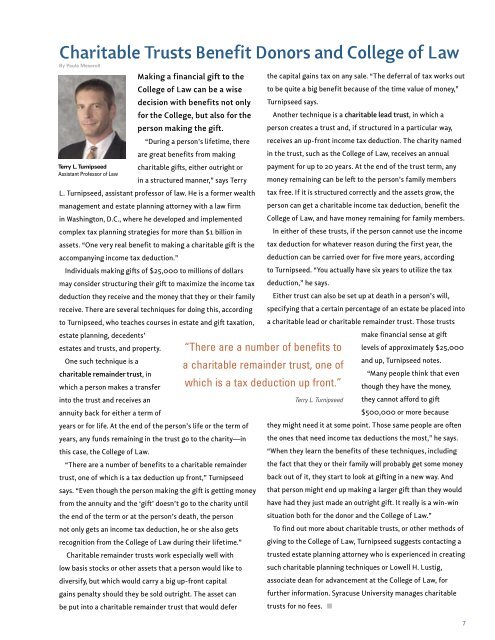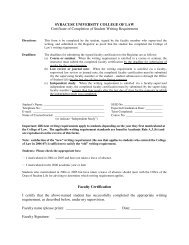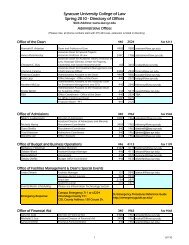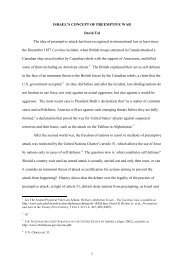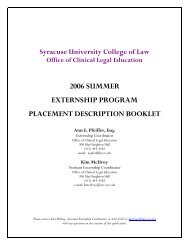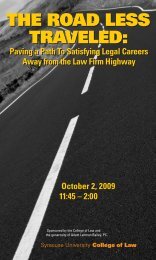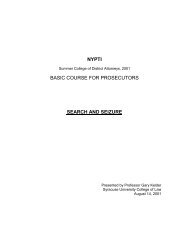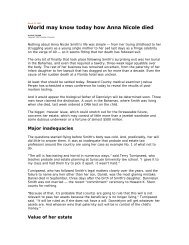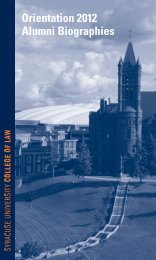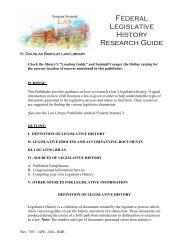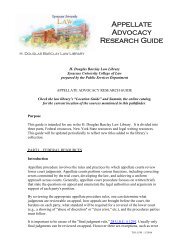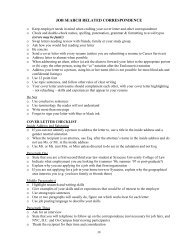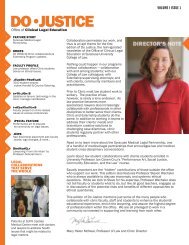Honor Roll of Donors - Syracuse University College of Law
Honor Roll of Donors - Syracuse University College of Law
Honor Roll of Donors - Syracuse University College of Law
Create successful ePaper yourself
Turn your PDF publications into a flip-book with our unique Google optimized e-Paper software.
Charitable Trusts Benefit <strong>Donors</strong> and <strong>College</strong> <strong>of</strong> <strong>Law</strong><br />
By Paula Meseroll<br />
Terry L. Turnipseed<br />
Assistant Pr<strong>of</strong>essor <strong>of</strong> <strong>Law</strong><br />
Making a financial gift to the<br />
<strong>College</strong> <strong>of</strong> <strong>Law</strong> can be a wise<br />
decision with benefits not only<br />
for the <strong>College</strong>, but also for the<br />
person making the gift.<br />
“During a person’s lifetime, there<br />
are great benefits from making<br />
charitable gifts, either outright or<br />
in a structured manner,” says Terry<br />
L. Turnipseed, assistant pr<strong>of</strong>essor <strong>of</strong> law. He is a former wealth<br />
management and estate planning attorney with a law firm<br />
in Washington, D.C., where he developed and implemented<br />
complex tax planning strategies for more than $1 billion in<br />
assets. “One very real benefit to making a charitable gift is the<br />
accompanying income tax deduction.”<br />
Individuals making gifts <strong>of</strong> $25,000 to millions <strong>of</strong> dollars<br />
may consider structuring their gift to maximize the income tax<br />
deduction they receive and the money that they or their family<br />
receive. There are several techniques for doing this, according<br />
to Turnipseed, who teaches courses in estate and gift taxation,<br />
estate planning, decedents’<br />
estates and trusts, and property.<br />
One such technique is a<br />
charitable remainder trust, in<br />
which a person makes a transfer<br />
into the trust and receives an<br />
annuity back for either a term <strong>of</strong><br />
years or for life. At the end <strong>of</strong> the person’s life or the term <strong>of</strong><br />
years, any funds remaining in the trust go to the charity—in<br />
this case, the <strong>College</strong> <strong>of</strong> <strong>Law</strong>.<br />
“There are a number <strong>of</strong> benefits to a charitable remainder<br />
trust, one <strong>of</strong> which is a tax deduction up front,” Turnipseed<br />
says. “Even though the person making the gift is getting money<br />
from the annuity and the ‘gift’ doesn’t go to the charity until<br />
the end <strong>of</strong> the term or at the person’s death, the person<br />
not only gets an income tax deduction, he or she also gets<br />
recognition from the <strong>College</strong> <strong>of</strong> <strong>Law</strong> during their lifetime.”<br />
Charitable remainder trusts work especially well with<br />
low basis stocks or other assets that a person would like to<br />
diversify, but which would carry a big up-front capital<br />
gains penalty should they be sold outright. The asset can<br />
be put into a charitable remainder trust that would defer<br />
the capital gains tax on any sale. “The deferral <strong>of</strong> tax works out<br />
to be quite a big benefit because <strong>of</strong> the time value <strong>of</strong> money,”<br />
Turnipseed says.<br />
Another technique is a charitable lead trust, in which a<br />
person creates a trust and, if structured in a particular way,<br />
receives an up-front income tax deduction. The charity named<br />
in the trust, such as the <strong>College</strong> <strong>of</strong> <strong>Law</strong>, receives an annual<br />
payment for up to 20 years. At the end <strong>of</strong> the trust term, any<br />
money remaining can be left to the person’s family members<br />
tax free. If it is structured correctly and the assets grow, the<br />
person can get a charitable income tax deduction, benefit the<br />
<strong>College</strong> <strong>of</strong> <strong>Law</strong>, and have money remaining for family members.<br />
In either <strong>of</strong> these trusts, if the person cannot use the income<br />
tax deduction for whatever reason during the first year, the<br />
deduction can be carried over for five more years, according<br />
to Turnipseed. “You actually have six years to utilize the tax<br />
deduction,” he says.<br />
“There are a number <strong>of</strong> benefits to<br />
a charitable remainder trust, one <strong>of</strong><br />
which is a tax deduction up front.”<br />
Either trust can also be set up at death in a person’s will,<br />
specifying that a certain percentage <strong>of</strong> an estate be placed into<br />
a charitable lead or charitable remainder trust. Those trusts<br />
Terry L. Turnipseed<br />
make financial sense at gift<br />
levels <strong>of</strong> approximately $25,000<br />
and up, Turnipseed notes.<br />
“Many people think that even<br />
though they have the money,<br />
they cannot afford to gift<br />
$500,000 or more because<br />
they might need it at some point. Those same people are <strong>of</strong>ten<br />
the ones that need income tax deductions the most,” he says.<br />
“When they learn the benefits <strong>of</strong> these techniques, including<br />
the fact that they or their family will probably get some money<br />
back out <strong>of</strong> it, they start to look at gifting in a new way. And<br />
that person might end up making a larger gift than they would<br />
have had they just made an outright gift. It really is a win-win<br />
situation both for the donor and the <strong>College</strong> <strong>of</strong> <strong>Law</strong>.”<br />
To find out more about charitable trusts, or other methods <strong>of</strong><br />
giving to the <strong>College</strong> <strong>of</strong> <strong>Law</strong>, Turnipseed suggests contacting a<br />
trusted estate planning attorney who is experienced in creating<br />
such charitable planning techniques or Lowell H. Lustig,<br />
associate dean for advancement at the <strong>College</strong> <strong>of</strong> <strong>Law</strong>, for<br />
further information. <strong>Syracuse</strong> <strong>University</strong> manages charitable<br />
trusts for no fees.<br />
7


